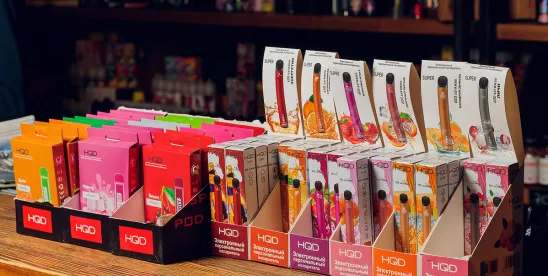On May 14, Alabama Gov. Kay Ivey signed Alabama HB8 into law. Effective June 1, HB8 introduced sweeping changes that will reshape how nicotine products are sold, marketed, and regulated in Alabama. You heard that right, nicotine — not cannabis. While the subject of HB8 is a little out of our typical green wheelhouse, this coverage is backed by popular demand and it implicates many issues facing the cannabis industry in Congress, state houses, and courthouses across the country.
While the bill’s primary focus is public health — specifically, curbing youth vaping — its impact on businesses and consumers will be significant. In this post, we break down the key provisions of HB8 and explore what they mean for retailers, manufacturers, and vape enthusiasts.
Grab a spot on the couch, pop some popcorn (the snack, not the lung condition), and let’s unpack this thing.
Youth Access & Possession Restrictions
With limited exceptions, individuals under the age of 21 are prohibited from using or possessing nicotine products. The use of fake identification by anyone under the age of 21 to purchase nicotine products is also prohibited, and the punishment for attempts to do so increase with each violation.
Specialty Retailers
The law creates a new category of regulated business: the “specialty store.” Specialty retailers must prohibit anyone under the age of 21 from entering the premises by utilizing third-party age verification technology. To legally operate as a specialty retailer of electronic nicotine delivery systems (ENDS), one must pay a $1,000 annual licensing fee per location and a $50 application fee per location. Notably, HB8 restricts the sale of all non-federally authorized nicotine products to these specialty stores only. Practically speaking, this means that all but 34 products, including a swath of popular flavored nicotine products, are restricted to specialty stores.
Sales Restrictions
HB8 bans the sale of nicotine products through vending machines and prohibits self-service displays outside of specialty retailers. Synthetic nicotine products are illegal without federal authorization. All liquid nicotine containers intended for use in ENDS must be sold in child-resistant packaging. Additionally, all nicotine retailers must post clear signage about the legal age requirement and health risks, with specialty retailers of alternative nicotine products, e-liquids, and ENDS required to display additional warnings.
American Made or Federally Authorized
Beginning October 1, 2025, no e-liquid, ENDS, or alternative nicotine product may be added to Alabama’s publicly available ENDS Directory unless it is either (1) made, packaged, and labeled in the United States or (2) has received federal authorization.
Search, Seizure & Forfeiture Provisions
Unauthorized nicotine products, along with any fixtures, equipment, materials, or property associated with their sale or use, may be subject to search, seizure, and forfeiture or destruction.
Advertising & Marketing Restrictions
HB8 severely limits how nicotine products may be marketed. Claims by retailers or manufacturers that products help with tobacco cessation or are safer alternatives to cigarettes are prohibited unless explicitly authorized by the FDA. Retailers and manufacturers must limit billboard advertisements to references to tobacco, menthol, or mint flavors. They may not advertise on any billboard within 1,000 feet of schools and playgrounds and are prohibited from referencing candy, desserts, brand-name sweets, or other flavors or imagery likely to appeal to minors, such as cartoon or video game characters.
Specialty retailers and manufacturers may not advertise in or sponsor youth-oriented events or publications, and the law further prohibits them from offering scholarships or sponsorships in connection with nicotine products.
Specialty retailers may not use flashing lights or additional signage, apart from signage displaying the business’s trade name, indicating they sell ENDS, alternative nicotine products, or e-liquids.
Public Education & Prevention Measures
The Alabama State Board of Education must establish a model K–12 policy for vape education and prevention, which (at a minimum) each local school board must adopt by November 1, 2025.
Fees for Manufacturers & Certification, Documentation & Notification Requirements
Manufacturers of e-liquids and alternative nicotine products are subject to a $2,000 initial registration fee and a $500 annual renewal fee to continue operating in Alabama.
Manufacturers of e-liquids and alternative nicotine products are required to submit certifications under penalty of perjury disclosing the nicotine source, manufacturing location, and federal regulatory status of their products. They must also provide supporting documentation and product information, and they have a continuing obligation to notify the state of material changes.
Oversight, Enforcement & Advisory Boards
The Alcoholic Beverage Control (ABC) Board is designated as the primary enforcement authority. It has the power to impose fines, revoke permits, and adjudicate contested applications and enforcement actions. Additionally, HB8 establishes an advisory board composed of representatives from various parts of the state government, as well as the executive director of a nonprofit organization (Children First) tasked with monitoring the implementation of HB8.
Allocation of Funds
HB8 creates the Vaping Licensing and Enforcement Fund, and money collected pursuant to HB8, with limited exceptions, will be distributed as follows: 40% to licensing and compliance efforts, 20% to the Public Safety Fund for enforcement, 20% to the State Board of Education for awareness and prevention programming, and 20% to the Unified Judicial System for education, prevention, and substance abuse initiatives.
Proponents see HB8 as a clear, bipartisan victory for youth safety. Those opposed might say the bill introduces restrictions that will negatively affect small businesses and create a larger underground market for minors.




 />i
/>i

